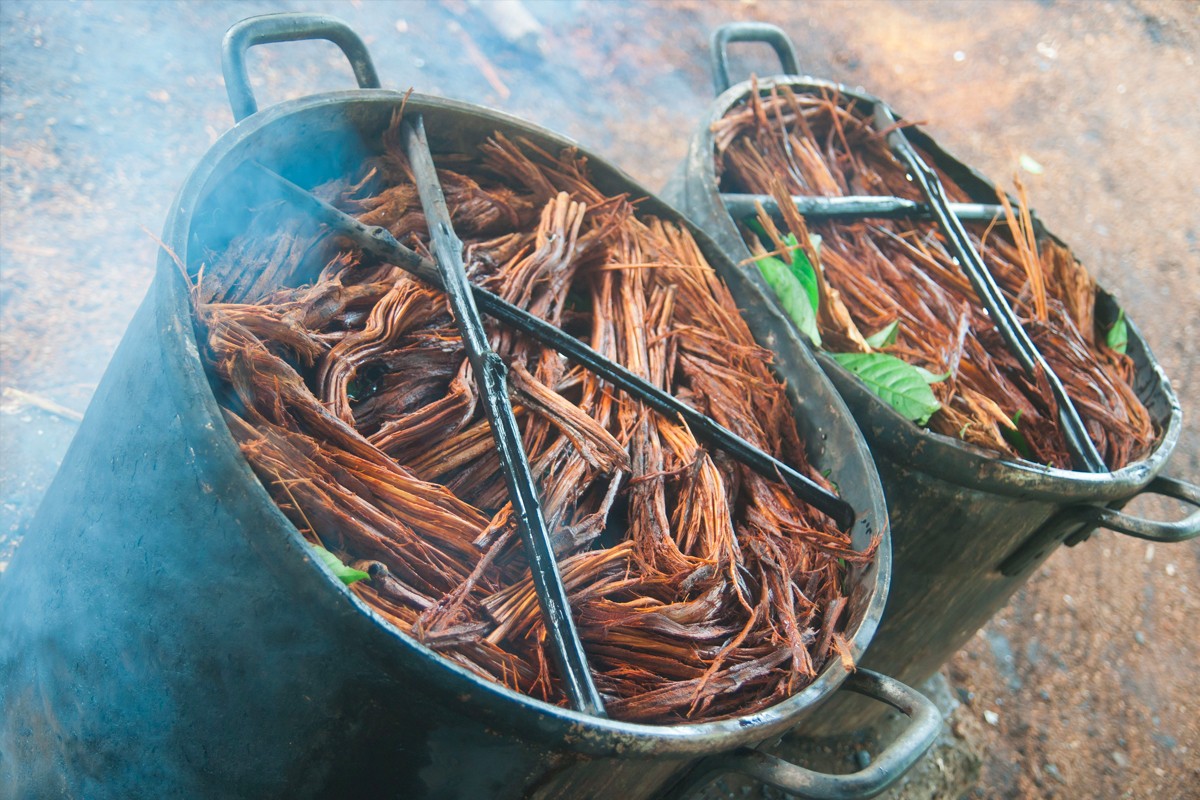死藤水
 |
死藤水,(奇楚瓦語:Ayahuasca),是Banisteriopsis屬的卡皮木(英語:Banisteriopsis caapi)和Diplopterys屬的死藤(Diplopterys cabrerana)以及九節屬物種所煎熬成的一種飲料[1] [2] 。
目錄
簡介
死藤水,Ayahusca源自亞馬遜部落一帶, 最主要材料是一種死藤的植物, 所以中文名為死藤水, Ayahusca的主要作用是讓人開放非物質的感觀, 達到通靈, 接觸神明等目的。在香港法律上, Ayahusca不屬於毒品, 也沒有任何引致上癮的成份。
死藤水(Ayahusca)飲用後其中的N,N-二甲基色胺等致幻劑物質會發揮效用,並改變人的知覺、思維、情緒以及意識,使人產生幻覺或陷入部分領域認為的「通靈」狀態。
死藤水被當地的美洲原住民廣泛應用於宗教儀式中,過程中會與薩滿搭配,每個區域及不同的薩滿在煎煮的過程中都有自己的調配比例,大多分布於亞馬遜雨林周邊區域。
研究
1950年哈佛大學植物學家 Richard Evans Schultes 記錄,他在哥倫比亞的亞馬遜雨林中發現死藤水被當地人用於宗教和醫療中。
1993年,Charles Grob 展開死藤水對人類影響的研究。[3]
文化意義
死藤水在秘魯、委內瑞拉、哥倫比亞、玻利維亞、厄瓜多爾和巴西的亞馬遜文化中有着千年的淵源。
死藤水是一種南美巫醫的傳統用藥,據傳服用後可以治病、排毒,還有提升靈性、開發精神世界的神祕作用,因此它是原住民宗教儀式中不可或缺的元素,到了今日,則有不少旅客慕名而來,想要在南美洲開啟獨一無二的靈性之旅。
合法性
已知相思樹樹皮可精煉含有致幻生物鹼的N,N-二甲基色胺(DMT,叫做Dimethyltryptamine)[4]。
- DMT是一種自然產生的色胺,發現不僅在許多植物中, 在人體內有微量主要由大腦分泌。最早DMT是某些北美及南美巫師要通靈時,會吃一些DMT成份的藥草,來達到通靈。DMT在人類胚胎第49天開始分泌,有人認為這時是靈魂的開始。
延伸閱讀
- 威廉·柏洛茲 and 艾倫·金斯堡. The Yage Letters. San Francisco: City Lights, 1963. ISBN 0-87286-004-3
- Caiuby Labate, Beatriz & Cavnar, Clancy [Editors]: The Therapeutic Use of Ayahuasca. Springer, 2014. ISBN 978-3642404252 [Print]; ISBN 978-3-642-40426-9 [eBook]
- Lamb, Bruce F. Rio Tigre and Beyond: The Amazon Jungle Medicine of Manuel Córdova. Berkeley: North Atlantic, 1985. ISBN 0-938190-59-8
- Langdon, E. Jean Matteson & Gerhard Baer, eds. Portals of Power: Shamanism in South America. Albuquerque: University of New Mexico Press, 1992. ISBN 0-8263-1345-0
- Luna, Luis Eduardo. Vegetalismo: Shamanism among the Mestizo Population of the Peruvian Amazon. Stockholm: Almqvist & Wiksell International, 1986. ISBN 91-22-00819-5
- Luna, Luis Eduardo & Pablo Amaringo. Ayahuasca Visions: The Religious Iconography of A Peruvian Shaman. Berkeley: North Atlantic, 1999. ISBN 1-55643-311-5
- Luna, Luis Eduardo & Stephen F. White, eds. Ayahuasca Reader: Encounters with the Amazon's Sacred Vine. Santa Fe, NM: Synergetic, 2000. ISBN 0-907791-32-8
- 泰瑞司·麥肯南. Food of the Gods: A Radical History of Plants, Drugs, and Human Evolution.
- Ralph Metzner, ed. Ayahuasca: Hallucinogens, Consciousness, and the Spirit of Nature. New York: Thunder's Mouth, 1999. ISBN 1-56025-160-3
- Metzner, Ralph (Editor). Sacred Vine of Spirits: Ayahuasca, (2nd ed.) Rochester, Vt.: Park Street, 2006. ISBN 1-59477-053-0, ISBN 978-1-59477-053-1
- Ott, J. Pharmacotheon: Entheogenic Drugs, Their Plant Sources and History, (2nd ed.)(Paperback). Kennewick, Wash.: Natural Products, 1993. ISBN 0-9614234-9-8. ISBN 978-0-9614234-9-0
- Ott, Jonathan. Pharmahuasca: Human Pharmacology of Oral DMT Plus Harmine. Journal of Psychoactive Drugs (San Francisco: Haight-Ashbury Pub. in assoc. w. Haight-Ashbury Free Medical Clinic). April–June 1999, 31 (2): 171–7. ISSN 0279-1072. OCLC 7565359. PMID 10438001. doi:10.1080/02791072.1999.10471741.
- Polari de Alverga, Alex. Forest of Visions: Ayahuasca, Amazonian Spirituality, and the Santo Daime Tradition. Rochester, Vt.: Park Street, 1999. ISBN 0-89281-716-X
- Benny Shanon. The Antipodes of the Mind: Charting the Phenomenology of the Ayahuasca Experience. Oxford: Oxford University Press, 2002. ISBN 0-19-925293-9
- Rick Strassman. DMT: The Spirit Molecule: A Doctor's Revolutionary Research into the Biology of Near-Death and Mystical Experiences. Rochester, Vt.: Park Street, 2001. ISBN 0-89281-927-8
- Taussig, Michael. Shamanism, Colonialism, and the Wild Man: A Study in Terror and Healing. Chicago: University of Chicago Press, 1986. ISBN 0-226-79012-6
- Tupper, Kenneth. The Globalization of Ayahuasca: Harm Reduction or Benefit Maximization?. International Journal of Drug Policy. August 2008, 19 (4): 297–303. doi:10.1016/j.drugpo.2006.11.001.
- Tupper, Kenneth. Ayahuasca Healing Beyond the Amazon: The Globalization of a Traditional Indigenous Entheogenic Practice. Global Networks: A Journal of Transnational Affairs. 2009, 9 (1): 117–136. doi:10.1111/j.1471-0374.2009.00245.x.
- Tupper, Kenneth W.; Labate, Beatriz C. Plants, Psychoactive Substances and the International Narcotics Control Board: The Control of Nature and the Nature of Control (PDF). Human Rights & Drugs. 2012, 2 (1): 17–28 [2017-02-01]. (原始內容存檔 (PDF)於2021-01-15).
- Tupper, Kenneth W.; Labate, Beatriz C. Ayahuasca, Psychedelic Studies and Health Sciences: The Politics of Knowledge and Inquiry into an Amazonian Plant Brew (PDF). Current Drug Abuse Reviews. 2014, 7 (2): 71–80. PMID 25563448. doi:10.2174/1874473708666150107155042. (原始內容 (PDF)存檔於2015-09-22).
外部連結
參考資料
- ↑ 死藤水是什麼- 死藤水Ayahuasca中文百科,靈魂樹靈性植物中文百科
- ↑ 死藤水:究竟是巫醫的通靈密藥,抑或是致幻劑的一種?,CASE 報科學,2019-12-13
- ↑ The Hoasca Project. maps.org. [2016-07-10]. (原始內容存檔於2014-03-05).
- ↑ 提煉二甲基色胺 工程師製毒走私澳洲. 中央社. 2017-01-17 [2021-01-23]. (原始內容存檔於2020-11-24) (中文).
- ↑ 相思湯. (原始內容存檔於2018-10-17).